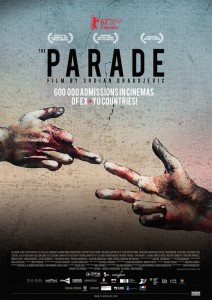Serbia’s Gay Rights Satire Gets UK Premiere Prior to DVD Release
 Few films from Serbia have received the support of Human Rights Watch, but a crowd pleasing satire on gay rights and homophobia will represent the country at the organisation’s international film festival in London, this week. The Parade, which has become a festival favourite and has generated impressive box office receipts of around four million euros, portrays the efforts of an unlikely bunch of former fighters from across the ex-YU to protect an Belgrade Pride parade.
Few films from Serbia have received the support of Human Rights Watch, but a crowd pleasing satire on gay rights and homophobia will represent the country at the organisation’s international film festival in London, this week. The Parade, which has become a festival favourite and has generated impressive box office receipts of around four million euros, portrays the efforts of an unlikely bunch of former fighters from across the ex-YU to protect an Belgrade Pride parade.
The Parade (Parada), from Pretty Village, Pretty Flame director Srdjan Dragojević, uses satire to highlight the level of homophobia in Serbia while pointing out the senselessness of the prejudice and the violence that often goes with it. On its release in Serbia, the Serbian Ministry of Education and Science even recommended that Parada should be screened in schools to stimulate debate and promote greater tolerance.
Serbia’s Turbulent History of Gay Rights
Anyone who is familiar with the turbulent history of gay rights in Serbia and the violence that met earlier attempts to host the Belgrade Pride Parade will recognise the issues raised by this film. Footage of the 2010 Belgrade event, when more than 100 police were injured and countless others were hurt, adds authenticity to this film.
Through comedy, Dragojević attracted a broad audience to what could have been a niche story about a subject that holds neither favour nor sympathy in the Balkans. Quite cleverly, his use of blatant stereotypes also played to familiar feelings with his audience and avoided the story becoming too preachy. However, some of the more overt caricatures can become wearisome and the clichéd anarchy and obvious one-liners can seem a little tired.
As director of a number of acclaimed films, including The Wounds (Rane) and Pretty Village, Pretty Flame, and as writer of the phenomenal hit Montevideo, Bog te Video, Srdjan Dragojević has been at the forefront of Serbian cinema for two decades. Inevitably, he is no stranger to controversy and has become a dab hand at dealing with it.
From the Director of Pretty Village, Pretty Flame & The Wounds
For this film, Dragojević is reported as saying that he wanted to use the same confrontational approach towards homophobia that served him so well with his portrayal of war in the former Yugoslavia in Pretty Village, Pretty Flame and The Wounds (Rane). In that respect, it would seem that he has been very successful. Despite the controversial subject, The Parade received largely positive reviews at home and has been awarded at film festivals.
The somewhat absurd story is a simple one, as two couples are thrown together: First up is Limun, a macho, middle-aged Serbian war veteran who is working as a rather dubious bodyguard, and Pearl, his beautician girlfriend. Then there is young gay couple Radmilo, a vet, and Mirko, a wedding planner.
Worlds collide after Radmilo saves the life of Limun’s pit-bull, the victim of a drive-by shooting, and Mirko takes on the organisation of the wedding of Pearl and Lemon. Without giving away too much of the convoluted story, Limun agrees to provide protection for the Belgrade Pride parade and sets off across the ex-YU in search of former fighters from all sides to work for his security firm on this job. The inevitable chaos and characters are rolled out as the bizarre road trip unfolds through Bosnia, Croatia and Kosovo.
Film Funding From Europe & Balkan States
On release, the film was applauded for showing people from across the Balkan states united in one aim. That they are working together to protect the rights of a minority for whom they had previously felt such anger only makes the impact of this meeting of like-minded people so strong.
The film was conceived in summer 2001, as Dragojević watched footage of gay people being beaten on the streets of Belgrade. After writing the screenplay, he managed to attract one million euros of funding from sources including the European Council’s Eurimages Fund, Serbian Ministry of Culture, Slovenian Ministry of Culture, the Croatian Audio-Visual Center, Macedonian Ministry of Culture, and the Belgrade embassies of Germany, The Netherlands, and France, as well as a clutch of Serbian businesses.
Human Rights Watch is an independent group dedicated to defending and protecting human rights by laying the legal and moral groundwork for justice and security around the world. The annual film festival highlights issues of human rights abuse around the world and puts the focus on people who use storytelling to achieve justice for all people. Human Rights Watch has worked with groups on the ground to lobby government officials, politicians and the judiciary to advocate for freedom of expression, association and assembly. In spite of this, the authorities prevented the Belgrade Pride Parade from going ahead in 2011 and 2012.
Film Festival Screening Times
![]()
The Parade will screen at Curzon Soho (20 March) and ICA (21 March) in London. Screenings will be in Serbian with English subtitles. The screening at the ICA will be followed by a Q&A with Human Rights Watch.
For those unable to attend a screening, an official DVD with English subtitles will be released on 29 April.


No comments yet.
Be first to leave your comment!